What Tea is Good for Lymphatic Drainage
The lymphatic system plays a crucial role in your body, functioning as a part of the immune system and a filter for harmful substances. It comprises lymph nodes, lymph vessels, and lymphatic organs. Proper lymphatic drainage ensures that lymph fluid can circulate and remove toxins from your body effectively.
Here are some key functions of the lymphatic system:
- Immunity: Lymph nodes produce immune cells that fight infections.
- Fluid Balance: Lymph vessels transport excess fluids away from tissues.
- Absorption: The system aids in the absorption of fats from the digestive tract.
To support lymphatic drainage, it's essential that you stay hydrated, eat a balanced diet, and engage in regular physical activity. These actions support your lymphatic system's functionality.
Bestsellers
Certain teas have been historically associated with promoting lymphatic drainage due to their diuretic and anti-inflammatory properties. They can supplement the natural process by possibly reducing water retention and aiding in the detoxification process. When choosing teas for lymphatic support, consider those with herbs and roots known for these qualities:
- Green Tea: Antioxidant-rich and boosts metabolism.
- Ginger Tea: Reduces inflammation and stimulates circulation.
- Turmeric Tea: Contains curcumin, which may support lymphatic function.
- Dandelion Tea: Often used as a natural diuretic to help with fluid removal.
Before incorporating new teas or herbs into your routine, it's advisable to consult with a healthcare professional, especially if you have pre-existing health conditions or take medications. Remember, these teas can support your lymphatic system but should complement a lifestyle that already prioritizes your overall health.
Best Teas for Lymphatic Support
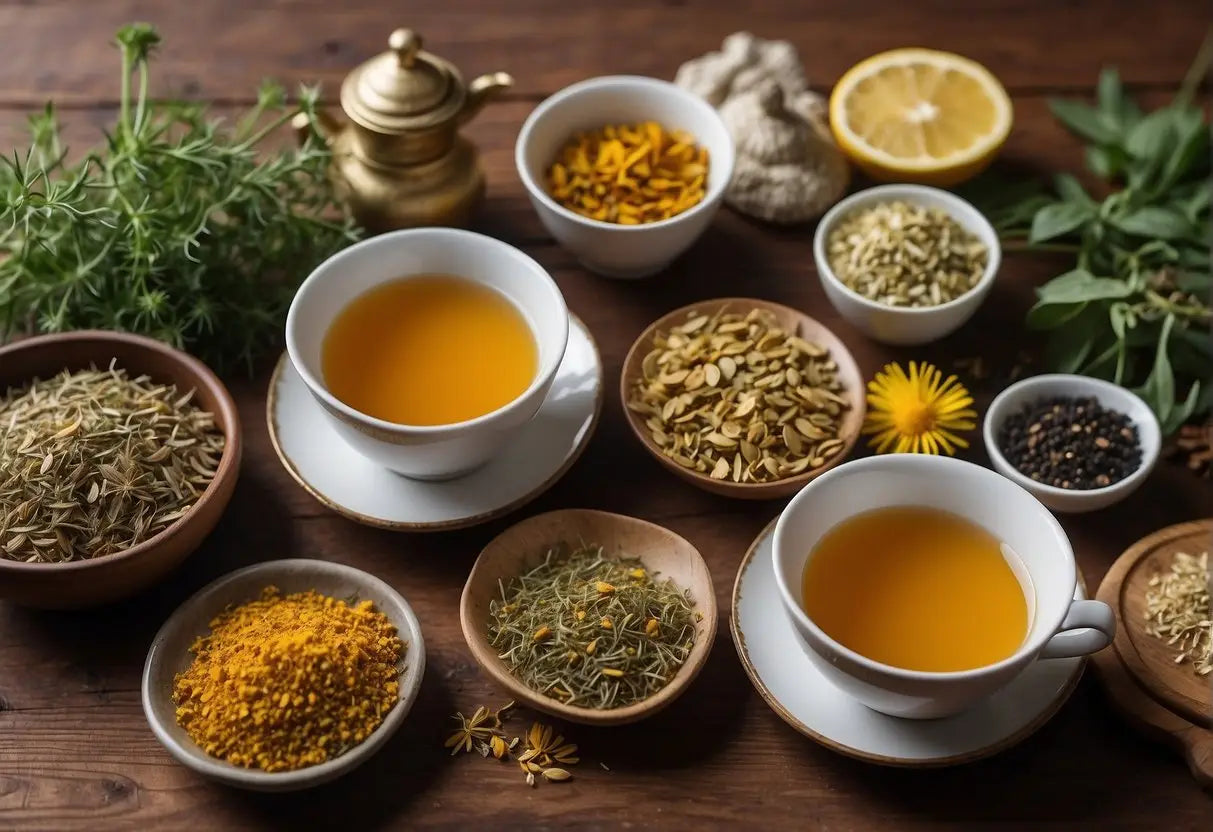
The teas listed here are known for their potential to aid the lymphatic system, which is crucial for detoxification and immune function.
Green Tea
Green tea is rich in antioxidants known as catechins. One catechin, EGCG (epigallocatechin gallate), has been found to support lymphatic function by reducing inflammation and possibly preventing lymphatic blockages.
Dandelion Tea
Dandelion tea offers diuretic properties that can help reduce water retention and promote lymphatic drainage. The roots and leaves of dandelion are used to stimulate the lymphatic system and remove toxins.
Ginger Tea
Ginger tea is recognized for its anti-inflammatory benefits. Its active compound, gingerol, may help increase lymph circulation and reduce swelling in lymph nodes.
Cleavers Tea
Cleavers is a traditional herb used specifically for lymphatic drainage. It can help to purify the lymphatic system, reduce congestion, and support overall lymphatic health.
Red Clover Tea
Red Clover tea contains isoflavones that can enhance lymphatic drainage and purify the bloodstream. This herb is commonly used as a detoxifying agent for the lymphatic system.
Mechanism of Herbal Teas on Lymph System
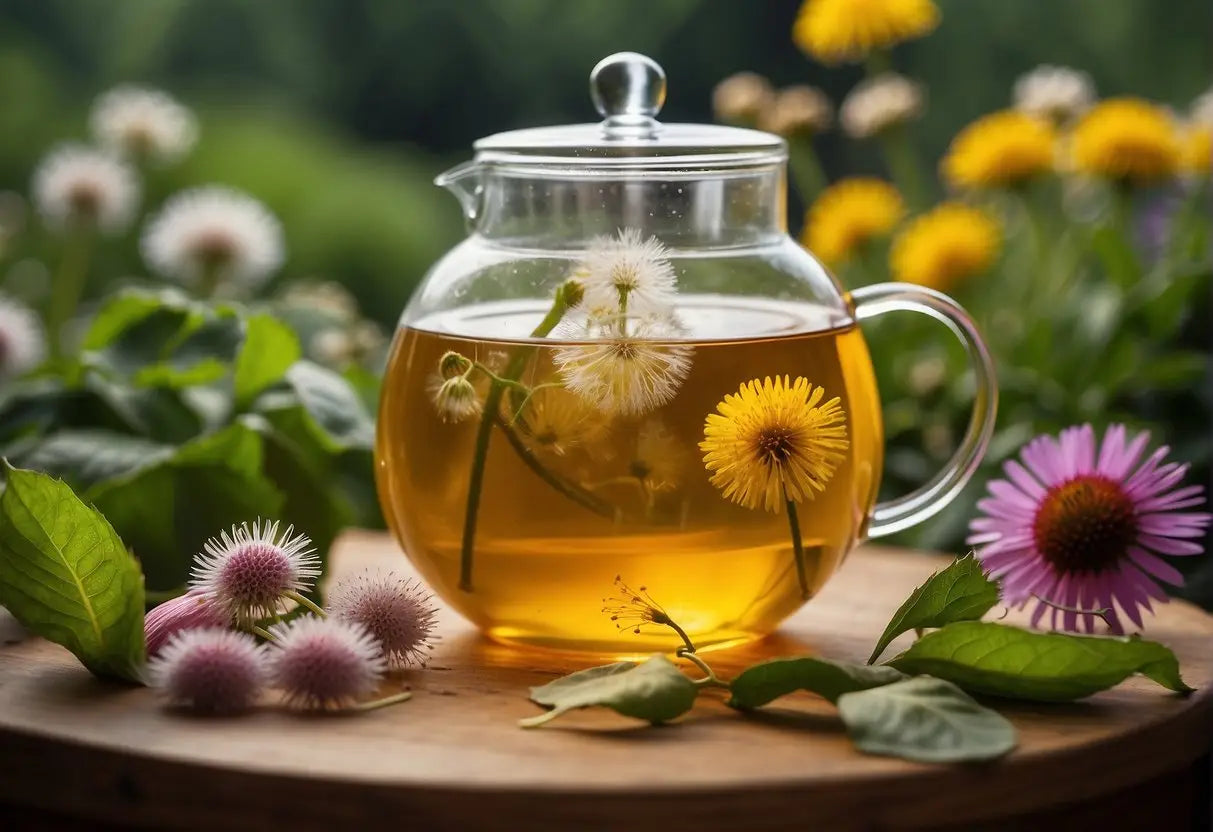
Herbal teas may influence your lymphatic system, a critical part of your immune response and waste removal. Cleavers, Calendula, and Red Clover are some herbs traditionally linked to lymphatic health.
When you consume these herbal teas, the bioactive compounds can interact with your lymphatic system in several ways:
Lao Ban Zhang
-
Stimulatory Effect: Some compounds have been reported to stimulate the activity of lymphocytes, which are white blood cells present in your lymph. For example, Echinacea can boost white blood cell production, enhancing your immune response.
-
Anti-inflammatory Action: Herbs like Turmeric contain curcuminoids, which may reduce inflammation, potentially reducing lymphatic congestion.
-
Detoxification Boost: Herbal teas might help in the detoxification process, supporting the lymph's role in filtering and cleansing the interstitial fluid.
Specific Herbal Teas and Their Potential Impacts:
| Herbal Tea | Reported Impact on Lymph System |
|---|---|
| Cleavers | May enhance lymphatic drainage and purify the lymph. |
| Calendula | Could stimulate lymphatic activity and support immunity. |
| Red Clover | Might help with cleansing the lymph and improving flow. |
These herbs contain various phytochemicals that may have a mild diuretic effect, thereby reducing the lymphatic load and promoting detoxification. Always consult your healthcare provider before trying new herbal remedies to ensure they are appropriate for your health.
Preparation and Brewing Techniques
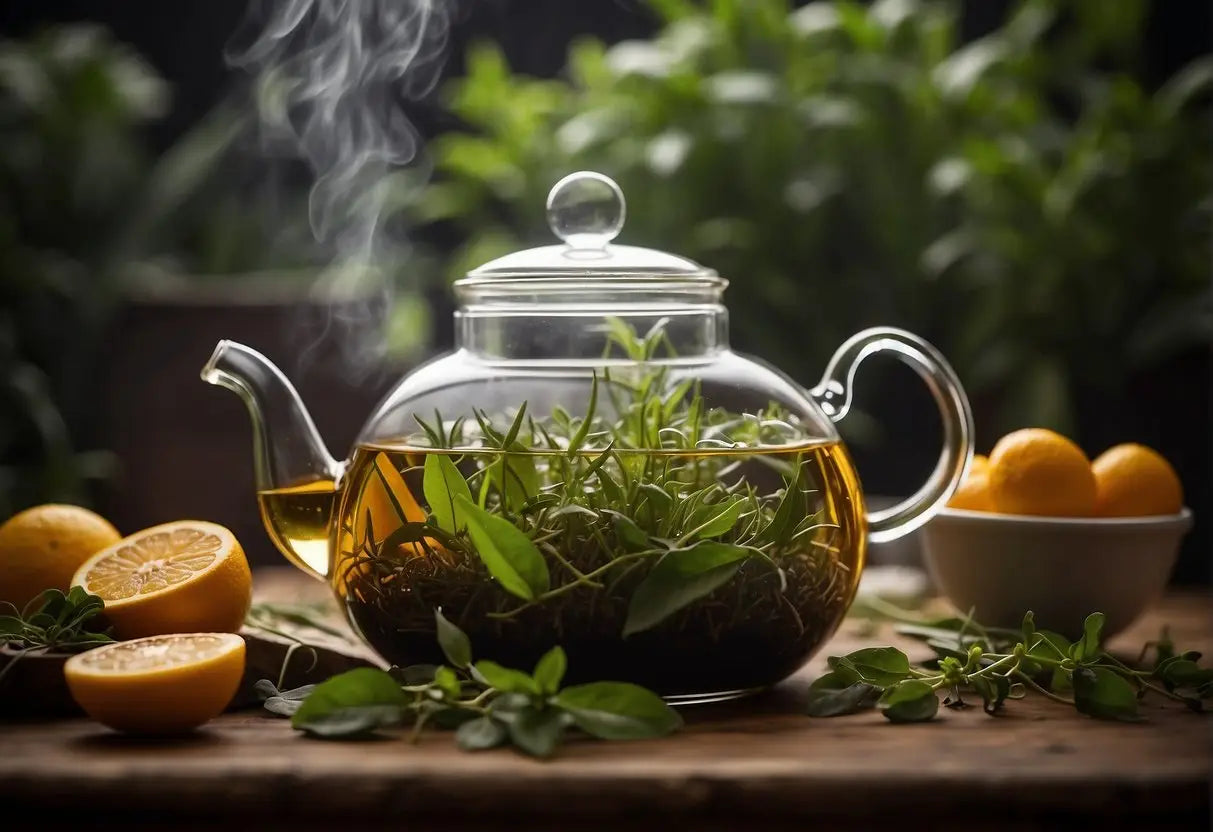
When preparing tea for lymphatic drainage, it is crucial to consider both the selection of tea and the actual brewing process to maximize the benefits.
Tea Selection:
- Choose organic teas to ensure fewer toxins enter your body.
- Focus on herbal teas known for their lymphatic drainage properties, such as dandelion, ginger, and cleavers.
Table: Recommended Teas for Lymphatic Drainage
| Tea Type | Characteristics | Brewing Temperature |
|---|---|---|
| Dandelion | Diuretic properties | 212°F (100°C) |
| Ginger | Anti-inflammatory | 208°F (98°C) |
| Cleavers | Lymphatic system stimulant | 200°F (93°C) |
- Water Quality: Use filtered or spring water for a cleaner taste and to avoid impurities.
- Water Temperature: Each tea has an optimal brewing temperature (see table above). Too hot may produce bitterness; too cool, and the tea may be under-extracted.
- Steeping Time: Generally, steep for 5-10 minutes. Longer steeping can release more beneficial compounds.
- Quantity: Use about 1 teaspoon of loose-leaf tea per cup (8 oz) of water.
Tips for enhancing lymphatic drainage:
- Consistently hydrate by drinking these teas throughout the day.
- Complement the teas with a balanced diet and physical activity for better results.
Remember, these teas are a part of an overall health routine and should be consumed in moderation. It's essential to listen to your body and adjust as necessary.
Lifestyle and Dietary Considerations
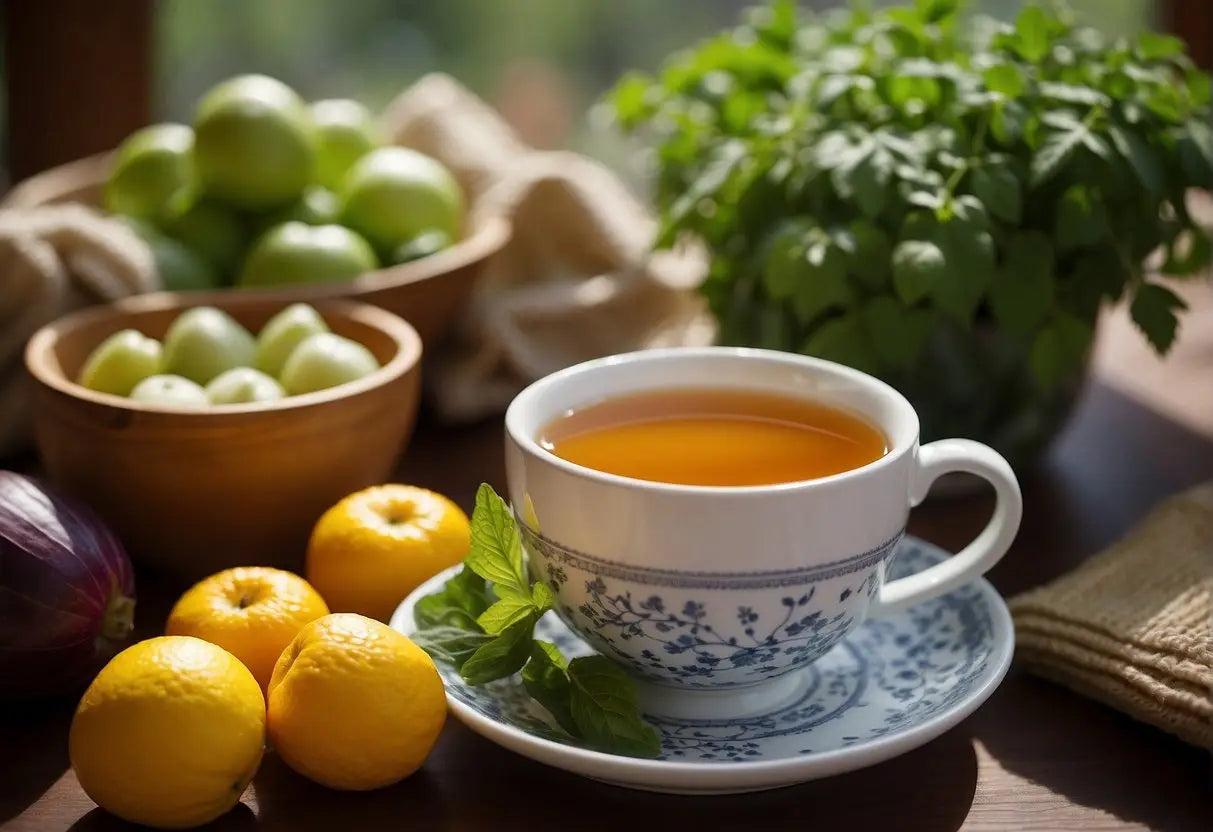
When focusing on lymphatic drainage, your lifestyle and diet play crucial roles. It's essential to maintain a balance that supports your lymphatic system's health.
Stay Hydrated: Consuming adequate water is fundamental. Aim for at least eight 8-ounce glasses daily to help keep the lymph fluid flowing smoothly.
Regular Exercise: Engage in activities like brisk walking, swimming, or yoga to stimulate lymph circulation.
Balanced Diet: Incorporate the following for optimal lymphatic function:
-
Fruits and vegetables: high in antioxidants and water content.
- Citrus fruits
- Berries
- Leafy greens
-
Healthy fats: moderate amounts aid in lymphatic activity.
- Avocado
- Nuts
- Seeds
Table 1: Foods to Include for Lymphatic Health
| Food Type | Examples |
|---|---|
| Fruits and vegetables | Citrus, berries, leafy greens |
| Healthy fats | Avocado, nuts, seeds |
Limit Processed Foods: Reduce intake of foods high in salt, sugar, and trans fats which can lead to fluid retention and sluggish lymphatics.
Mindful Eating: Pay attention to how your body feels after eating certain foods. This can help you identify any that may be detrimental to your lymphatic health.
Potential Risks and Interactions
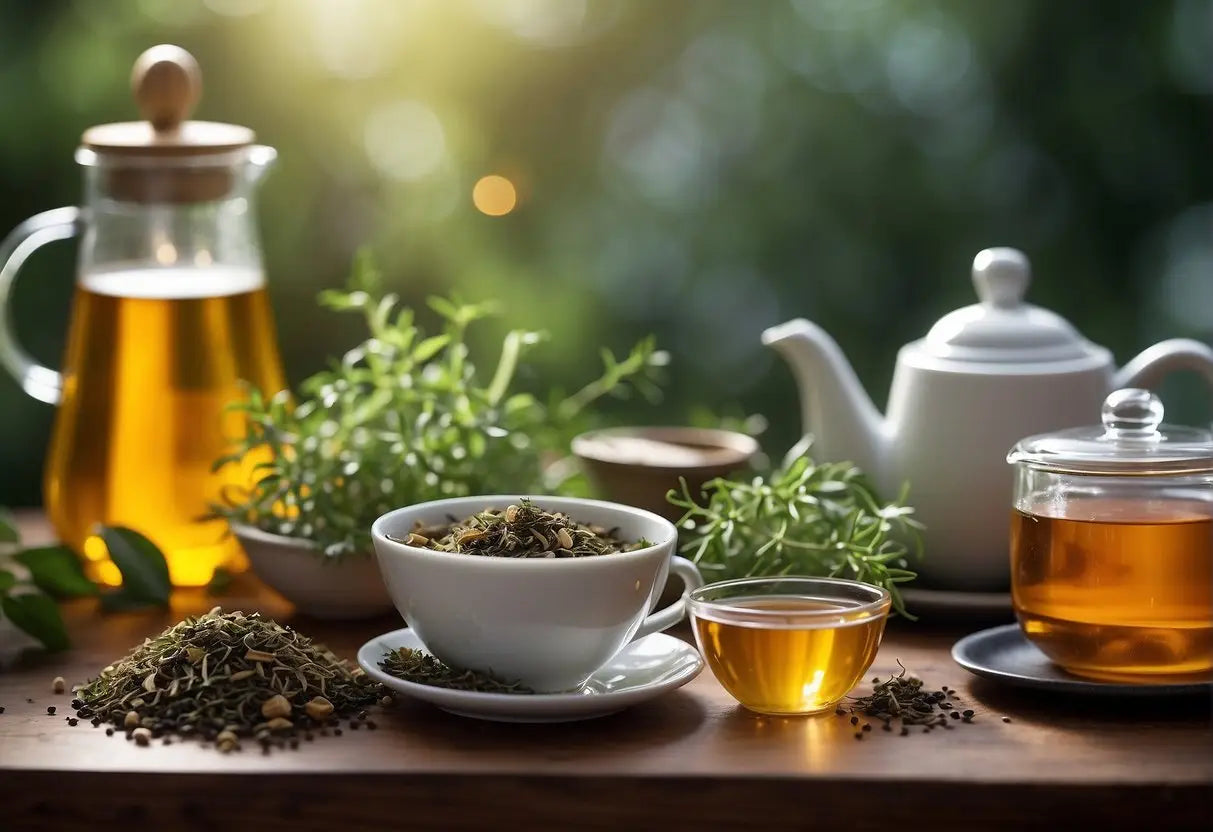
When you're exploring teas for lymphatic drainage, it's crucial to consider potential risks and interactions with other medications or health conditions. Some herbal teas may interact negatively with prescription medications or may not be suitable for everyone, particularly if you have certain health conditions.
Caffeine Content
Certain teas contain caffeine, which can cause:
- Insomnia
- Increased heart rate
- Elevated blood pressure
If you're sensitive to caffeine or have conditions affected by caffeine intake, opt for caffeine-free herbal teas.
Blood-Thinning Effects
Teas like green tea have blood-thinning properties. Be cautious if you're taking anticoagulant drugs such as:
- Warfarin
- Heparin
Diuretic Effect
Some teas can act as diuretics, leading to increased urination. This can affect electrolyte balance and may be a concern if you're on diuretics or have kidney issues.
| Herbal Tea | Concerns |
|---|---|
| Ginger | May interfere with blood thinners |
| Echinacea | Can counteract immunosuppressive drugs |
| Licorice | May increase blood pressure, avoid if hypertensive |
Allergic Reactions
Always consider the possibility of allergies. If you have a history of allergic reactions to plants or pollen, proceed with caution when trying new herbal teas.
Contraindications
Pregnant or breastfeeding women should avoid certain herbs, as they may not be safe for the baby. Always check with a healthcare provider before starting any new herbal regimen.
Finally, moderation is key. Excessive consumption of any tea can lead to unpleasant side effects. If you experience adverse reactions, discontinue use and consult a healthcare professional.
Frequently Asked Questions
In this section, you'll find concise answers to common queries about teas and practices that may help with lymphatic drainage.
Which herbs are known for aiding in the process of lymphatic cleansing?
Herbs such as cleavers, red clover, and calendula are well-regarded for their lymphatic cleansing properties. Incorporating these into your tea blends could be beneficial for lymphatic health.
Can dandelion tea support the lymphatic system, and how is it beneficial?
Yes, dandelion tea can support the lymphatic system due to its diuretic and detoxifying properties. It helps to purify the blood and remove toxins that can build up in the lymphatic system.
What dietary options should be considered to enhance lymphatic drainage?
A diet high in fruits, vegetables, nuts, and seeds—all rich in nutrients and antioxidants—can enhance lymphatic drainage. In particular, foods such as leafy greens, garlic, and citrus fruits are beneficial.
How does ginger tea influence lymphatic health, and should it be included in a daily regimen?
Ginger tea may help improve lymphatic health by reducing inflammation and stimulating circulation. Including it in your daily routine could aid in promoting lymph flow and detoxification.
Are there particular foods or habits that can negatively affect the lymphatic system?
Highly processed foods, excessive intake of dairy and salt, and a sedentary lifestyle can hinder the function of the lymphatic system. It's wise to avoid these to maintain proper lymphatic flow.
What are the best supplements or herbal remedies to encourage lymphatic drainage?
Supplements such as Astragalus, Echinacea, and Burdock root are considered effective in promoting lymphatic drainage. They help to strengthen the immune system and support lymphatic function.
← Older post Newer post →











